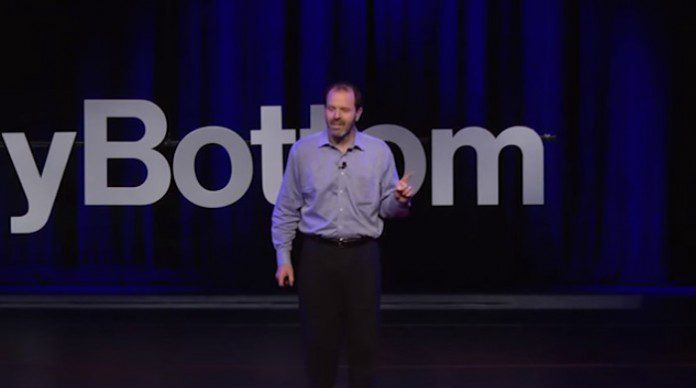We’ve already seen how the peer to peer movement has transformed the financial world. From crowdfunding to lending to equity financing, people are helping people like never before. History is moving along rapidly and we are finding with every passing day that this movement makes life easier in many different ways.
You can call Lyft or Uber instead of a taxi when you need a ride and have a car there in minutes. You can use sites like AirBnB to avoid the costs of a hotel when taking a vacation. In some cities, you can order something online and have it delivered to your door within an hour. You can even get your bathroom fixed, have a writer create content for you, or hire a virtual assistant thanks to this movement.
One of the most overlooked benefits of the peer to peer movement is that it injects money directly into local economies, bypassing large corporations and cutting out an extra layer of costs. The peer to peer movement decentralizes our economy, which is a positive.
The more we try to define the peer to peer movement, then the more it seems like we are unable to label it. As global internet connectivity improves and entrepreneurs continue to innovate, we will continue to see this industry change and the world will be forever different. Here is what we expect to see in the coming months and years with this movement.
#1. There will be more educational opportunities.
In the average developed nation, the population has a combined average of 1 trillion hours of free time to spend. Before the internet, this meant watching TV, playing VHS movies, tinkering with hobbies. Today this free time is used to access information. There are numerous ways that education will change thanks to the peer to peer movement.
- Private scholarships. Students can reach out to strangers around the world to fund their tuition costs. If 10,000 people contribute $5 each, that’s a full-ride scholarship with room to spare at many public US universities.
- Free educational opportunities. Many schools are putting free classes online that can be accessed at any time when students want to learn something. It may not result in a degree, but knowledge is still gained.
- Global awareness. Educational opportunities allow each of us to take ownership of our lives, the issues that are important to us, and create our own form of self-governance which allows us to protect our best interests.
People are watching less TV and spending more time on their computers, tablets, and smartphones. The information which the peer to peer movement has made freely available to any who wish to learn has really energized all of humanity once again.
And here’s the best part: anyone in any part of the world with a connection to the internet can become part of this global community. The developing nations may soon become developed thanks to this movement.
#2. There will be more forms of creativity.
You’ll find numerous creative projects on the average crowdfunding site right now. From music albums to new board games to new books, people are finding ways to utilize their social and professional networks to express themselves. This has changed how we as a people engage with these ideas. Instead of being influenced by a corporate need for profits, we can finance our own items that fit with our own expectations.
This means the peer to peer movement is literally changing human culture. Here’s why.
- No one is in control of all the information. In the past, the information we passed from one person to another was controlled by a small minority of people. Today anyone can propose a new idea about anything online and have someone decide that the idea is good enough to receive funding.
- New media outlets are being created. “If it bleeds, it leads.” That has been the focus of the media for more than a generation. Thanks to the P2P movement, alternative broadcasting outlets like Upworthy or Positive TV can change the message being presented, altering the often dystopian look at the future that is freely offered.
- New stories means new strength. What makes people different is what makes a community stronger. As we get to see each new element of human culture in a first-hand way, the boundaries between majorities and minorities becomes blurred like never before.
Creativity comes in many forms. Thanks to the peer to peer movement, we no longer need to adjust our tastes and preferences to what corporations want. We can dictate what we receive, work with innovators to make things happen, and pursue our own interests as a path toward potential profitability even when the corporate executives think it isn’t possible.
Time for motivational #quote by stellarfutures Personal creativity is an expression of your intelligence. Dare to b… pic.twitter.com/RyTlgkaX2W
— QOTDprinted (@QOTDprinted) January 3, 2016
#3. We can take action right now.
For more than a generation, there has been a debate about global warming. Some say it is a natural cycle. Others say the problems are man-made. Thanks to the peer to peer movement, those who agree that a specific issue needs to be addressed can take action. Instead of preaching to the choir in our conversations, we can take action right now. What does this mean for the future?
- Hunger can disappear. The planet already produces more food than it needs. How is it then that 1 in 7 people don’t have enough food to eat? It’s because government-to-government actions don’t have the same efficiencies as person-to-person interactions. We can bypass the bureaucracy.
- Poverty can disappear. The P2P movement has purchased new cars for people who have long commutes to work. It has funded tiny homes for the homeless. It provides vocational training, funding for shelters, and hot meals. By sharing a little, we can stop the cycle of poverty before the end of the next generation.
- We can step out of fear. No longer do we need to be ruled by fear or greed. We can instead strive toward a community that seeks out harmony with each other and connect with the rest of the world.
By taking action right now, we can literally redefine what we all consider to be a “success.” Gone will be the arguments about tolerance, diversity, or equality because together, through the peer to peer movement, we are building something that gives us all an equal level of skin in the game based on how involved we want to become.
#4. It changes how we think about security.
If you have an emergency, then what do you do? Call 911 or 999 [or your emergency number in your area]? What if the peer to peer movement could become involved in the world of policing? It is a service that is essential because people cannot do it on their own. We’re already seeing this happen thanks to an app called Peacekeeper and here are some of the benefits that we could see in the future.
- It can provide a clear picture of an incident. The case of Tamir Rice is a prime example of how the peer to peer movement is changing the world. Instead of a phone call about a boy playing in a park with a gun, an app could send real time video to officials so they can see what is happening and discern a threat level while en route instead of being forced to function re-actively.
- Courts and laws could go online. Blockchains could be used to verify legal contracts or manage internal conflicts. Securities could be issued. Bitcoin has proven that this can be done, although some changes to the security of the blockchains may be necessary as we move forward.
- The system could be fully automatic. What if there is a home invasion while you’re sleeping? Your security system could film the suspect in real time, lock down the locations of you and your family, and allow police to respond faster because there isn’t a delay any more in the communication.
- We could even begin to remove prisons from society. Instead of making people serve time in a small cell, we could have them serve sentences at home with an online and privatized legal system. Employees in the prison system could be transferred into private settings to monitor each home sentence, negating some of the effects on the economy.
In this part of the peer to peer movement, the ground really is shifting quickly toward new and innovative ideas. It isn’t coming from the public sector. It’s coming from the private sector because they don’t see themselves being as safe today as they were in the past. In other words, the community saw a need, found an idea to meet that need, and is now working on funding and implementing the solutions to permanently end the problem for good.
Instead of waiting for the government to act, people are acting together. That’s an amazing sight to see.
#5. We can preserve our history.
Every community has something that deserves to be preserved. Maybe it’s Roman ruins that are unique. It could be the first home that was built in the area. It might be a work from a world-famous architect. The fact is that preserving history can cost a fortune, yet if we lose our history, then we are placing ourselves at risk of repeating the same mistakes as the generations which came before. This is how the peer to peer movement is making historical preservation easier than ever before.
- It makes the system completely voluntary. Instead of a community raising taxes or levies to preserve historical locations or districts, only people who want to get involved participate and this makes the effort much more enjoyable to all. No one feels forced to join.
- It lessens the load. Under the current system, many property owners are forced to upkeep their home in a specific way to preserve it. This can cost hundreds of thousands of dollars every year in some instances. By getting peers involved, the loads can be lessened somewhat.
- It allows us to connect the past, present, and future. Who we are today is because of who came before us. Who we will be in the future is based on the decisions we will make today. Thanks to the peer to peer movement, we can as a community make these decisions together more than we have ever been able before.
The peer to peer movement will one day become part of history as well. It will be seen as the way humanity was able to come together, focus on our best interests as a group, and take action. Best of all, no one is forced to get involved if that is their preference. This is why P2P is such a powerful concept.
#6. It creates global business opportunities for everyone.
A freelancer with a home computer a cheap desk from the local thrift store can put their talents online and have anyone in the world hire them. A global business used to take months or years to establish itself. Today, with the right set of skills, it can be done in minutes by virtually anyone. Maybe an idea doesn’t work well in the USA – but in Singapore? People can’t get enough of it. That creates a business opportunity that wouldn’t have existed before the P2P movement.
The future of global business will belong to the right brain thinkers. pic.twitter.com/qCdwHSwx8E
— Jane Fuller (@jcfullerlondon) January 2, 2016
Why is that so important? Because it changes how we think of business as well. In the US, 97-99% of all employees work for a business with 500 or fewer employees. The peer to peer movement can immediately open up new markets to get those people employed. It also opens up these additional benefits.
- Anyone can turn their talents into profitability. Maybe a writer can’t create a work of fiction, but can create product marketing materials. A painter can’t sell paintings, but can create graphics for gaming cards. The P2P movement allows people to explore their unique talents to see if the marketplace has a spot for it.
- It improves local economies. The peer to peer movement might be global in nature, but it is local when it comes to economic improvements. The money contributed to new ideas is generally spent locally or regionally, helping everyone in the area.
- Competition becomes a thing of the past. There will always be competition, but each person or organization has a specific niche expertise that will always be their own. This means there will always be a place here for anyone who wants to get involved.
The peer to peer movement has already funded these opportunities by working to shift money into communities by taking it out of banks. People are discovering what kind of government they’d prefer to have and are transforming their communities.
In Conclusion
Trying to define the peer to peer movement in many ways is a pointless exercise. Every time we think we’ve got a handle on what this movement can do, it surprises us by coming up with something even more amazing. That’s why it really is changing the world forever.
Unlike other movements, this is a good change. The goal is for everyone to benefit in some way without coercing people to join the movement. This creates an environment which is warm and welcoming and that can lead to even more innovation.
How far can the peer to peer movement go? We’ve highlighted some sections where we think the results will be amazing, but the reality here is that it is up to the crowd to see how far it can go.
Strong proponent of individual liberty and free speech. My goal is to present information that expands our awareness of crucial issues and exposes the manufactured illusion of freedom that we are sold in America. Question everything because nothing is what it seems.


















